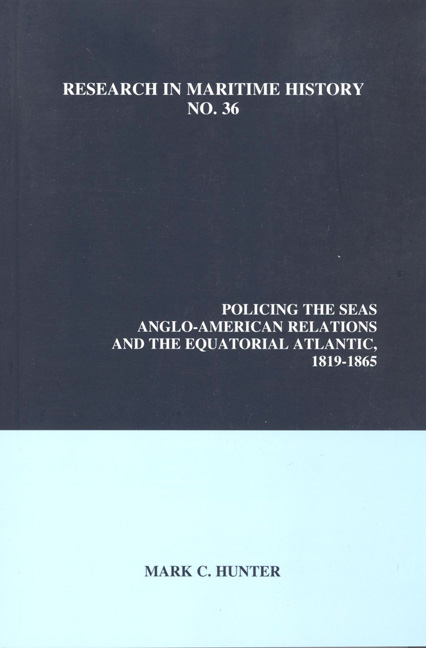Book contents
- Frontmatter
- Contents
- List of Tables
- List of Illustrations
- About the Author
- Acknowledgements
- Chapter 1 Introduction
- Chapter 2 The Atlantic
- Chapter 3 Anglo-American Policymaking, 1819-1834
- Chapter 4 Naval Relations and the Suppression of Piracy and Slaving, 1820-1830
- Chapter 5 A Naval Compromise, 1830-1842
- Chapter 6 The Royal Navy and West Africa, 1843-1857
- Chapter 7 The US Navy and West Africa, 1843-1857
- Chapter 8 Conflict Avoidance in the Equatorial Atlantic
- Chapter 9 The Civil War and Conflict Resolution in the Equatorial Atlantic
- Select Bibliography
Chapter 2 - The Atlantic
- Frontmatter
- Contents
- List of Tables
- List of Illustrations
- About the Author
- Acknowledgements
- Chapter 1 Introduction
- Chapter 2 The Atlantic
- Chapter 3 Anglo-American Policymaking, 1819-1834
- Chapter 4 Naval Relations and the Suppression of Piracy and Slaving, 1820-1830
- Chapter 5 A Naval Compromise, 1830-1842
- Chapter 6 The Royal Navy and West Africa, 1843-1857
- Chapter 7 The US Navy and West Africa, 1843-1857
- Chapter 8 Conflict Avoidance in the Equatorial Atlantic
- Chapter 9 The Civil War and Conflict Resolution in the Equatorial Atlantic
- Select Bibliography
Summary
The French Revolutionary and Napoleonic wars left the US and Britain as the major players in the Atlantic. Postwar economic conditions are significant because their policies and growth shaped their naval deployment and relations. Their often divergent goals created conditions that might increase Anglo-American tensions in regions like the equatorial Atlantic where the two met on the “great common” in the West Indies and West Africa, two important areas for their emerging policies. While both nations eyed the other with suspicion, their “interest aggregation” preferred the peaceful pursuit of objectives.
While Britain and the US were wary of each other during crises, their adherence to the peaceful use of sea power provided a way to co-exist. Since British capitalists wanted growth and the protection of overseas trade, political leaders avoided provoking rivals like France and the US into combining to threaten these interests. Instead, London hoped to achieve its economic goals through an emerging free-trade policy, conflict avoidance and the “peaceful” use of sea power. While the US also felt that sea power could be used peacefully, its policies wavered as the nation went through growing pains.
The Atlantic Theatre
During the early nineteenth century, Western Europe was the most developed region on the Atlantic littoral, with London as the world's financial centre. Europe's share of manufacturing output and levels of industrialization grew, with Britain at the forefront (see tables 2.1 and 2.2). While manufacturing output in the US lagged until the early twentieth century, it was growing. As British and American industrial might and the hunger for more markets and resources grew, they backed up their aspirations with mechanized firepower. Nonetheless, a balance-of-power strategy governed geopolitical relations in the Atlantic. European powers worked to prevent France's aggressive rebirth, and its relative share of power fell. Meanwhile, conservative attitudes, like those of Prince Metternich, played a role in British strategic thinking. The continuance of the “rule of law” philosophy helped govern its foreign policy. As Albert H. Imlah has observed, the system maintained order in Europe and “helped to prevent [the] balance of power from degenerating into mere competition for power.” Yet as Barry Gough has noted, the “general linkage of navy to Empire continues to escape historians.”
- Type
- Chapter
- Information
- Policing the SeasAnglo-American Relations and the Equatorial Atlantic, 1819-1865, pp. 19 - 48Publisher: Liverpool University PressPrint publication year: 2008

